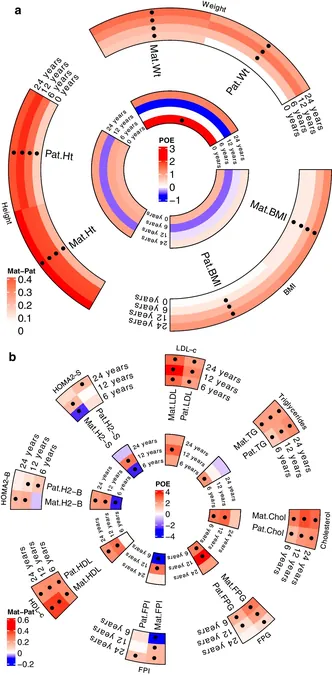
Groundbreaking Study Reveals Shocking Way Parents' Genes Influence Child's Health!
2025-04-08
Author: Jia
Groundbreaking Study Reveals Shocking Way Parents' Genes Influence Child's Health!
A recent study from Lund University has unveiled startling evidence that a child's health may be significantly influenced by their parents' metabolic traits, particularly with regard to insulin function and blood sugar regulation. The implications of this research could revolutionize preventive treatments aimed at reducing the risk of type 2 diabetes and cardiovascular diseases in future generations.
Diabetes researcher Rashmi Prasad, who spearheaded the study, previously discovered that specific genetic variations associated with a heightened risk of type 2 diabetes pose a greater threat when inherited from mothers, while the paternal side appears to have a less pronounced effect. This new research, published in the prestigious journal Diabetologia, delves deeper into how various traits linked to body weight, blood sugar levels, cholesterol, and insulin function are transmitted from parents to offspring and how these influences evolve over time.
"We found that mothers have the most substantial impact on their child's blood sugar and cholesterol levels throughout different stages of their life," says Prasad, Associate Professor of Genetics and Diabetes at Lund University’s Diabetes Centre. "Interestingly, insulin-related characteristics crucial for diabetes risk are increasingly influenced by fathers as children grow older, likely owing to paternal gene inheritance."
Insights from a Large Population Study
The research team, in collaboration with experts from King Edward Memorial (KEM) Hospital and Research Centre in Pune, India, analyzed data from a robust study involving 2,400 subjects from the Pune Maternal Nutrition Study (PMNS). The study tracked the metabolic traits of both parents and their children at various ages—specifically when the children reached 6, 12, and 24 years—providing invaluable insights into the familial transmission of metabolic health indicators.
Crucial findings showed that maternal genes significantly influenced not only the child's birth weight but also their aptitude for regulating blood sugar and lipids across their lifespan. "Our group analysis demonstrated a close resemblance in the blood sugar and lipids levels of mothers and their children. By understanding that maternal genes heavily impact a child's cholesterol regulation, we can tailor preventive treatments aimed at mothers during pregnancy, effectively lowering the likelihood of future cardiovascular diseases in their children," Prasad added.
The Role of Fathers in Insulin Function
Testing conducted within the study assessed the insulin sensitivity and functionality of insulin-producing cells in participants. The results indicated a notable effect of paternal genes on children’s insulin function across different ages, suggesting that fathers with insulin resistance could unknowingly pass on metabolic risks to their offspring.
Prasad emphasizes the necessity of addressing these risks: "If fathers exhibit insulin resistance and inadequate insulin secretion, it could portend health challenges for their children down the line. The good news is that enhancing physical activity can bolster insulin sensitivity for both parents and children alike. We already know that regular exercise significantly mitigates the risks associated with type 2 diabetes."
Looking Ahead: New Strategies to Combat Diabetes
The researchers hope this groundbreaking study spurs further investigations into the complexities of how parents' metabolic traits affect their children's health outcomes. The goal is to devise innovative strategies capable of wards off type 2 diabetes, cardiovascular diseases, and obesity starting from the earliest stages of life.
"This study highlights that while some observed traits stem from maternal genes, others may relate to the mother’s environmental influence during fetal development. We must conduct additional research to fully unravel the mechanisms underlying these parental effects. Nonetheless, our findings strongly indicate a dual contribution to a child's metabolism from both parents," Prasad concludes.
As this fascinating research continues to unfold, it opens new doors in understanding intergenerational health and may one day lead to preventative interventions that safeguard the well-being of future generations.





 Brasil (PT)
Brasil (PT)
 Canada (EN)
Canada (EN)
 Chile (ES)
Chile (ES)
 Česko (CS)
Česko (CS)
 대한민국 (KO)
대한민국 (KO)
 España (ES)
España (ES)
 France (FR)
France (FR)
 Hong Kong (EN)
Hong Kong (EN)
 Italia (IT)
Italia (IT)
 日本 (JA)
日本 (JA)
 Magyarország (HU)
Magyarország (HU)
 Norge (NO)
Norge (NO)
 Polska (PL)
Polska (PL)
 Schweiz (DE)
Schweiz (DE)
 Singapore (EN)
Singapore (EN)
 Sverige (SV)
Sverige (SV)
 Suomi (FI)
Suomi (FI)
 Türkiye (TR)
Türkiye (TR)
 الإمارات العربية المتحدة (AR)
الإمارات العربية المتحدة (AR)